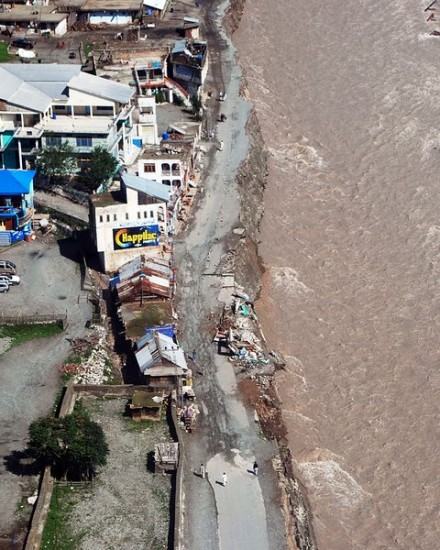
Pakistan flood damage
“Most of all, I love that Connecticut College students want to get involved with everything that is offered to them.”
Sometimes I wonder if this statement, the last line of my “Why Conn Coll?” essay, is what really got me in here. The admissions office seems to pride itself so much on students’ involvement, especially in international affairs. As the website proclaims, “Going to Connecticut College means going global.”
I loved the idea of SATA, CISLA and multiple other internationally-minded opportunities I read about. All year, new e-mails and letters poured in about the huge percentage of students that studied abroad, joined centers or created their own “global” majors. Honestly, most of the time when family and friends asked me why I wanted to come to Conn, I would cite one or more of these programs.
Needless to say, I arrived with high hopes of stepping into a world where everyone I knew would read the New York Times and donate all their spare change to causes halfway across the globe. Imagine my surprise when, three days after stepping foot on campus, I walked up the front steps to Cro and found myself staring at a table with a sign that read “2,000 people already died. 20,000 more partially or completely displaced. PAKISTANIS NEED OUR HELP.” The table was completely deserted.
The Connecticut College Students for Pakistan movement is the brainchild of Conn alumnus Nayan Bokherel (class of 2010), an international student from Nepal. Over the summer, he recruited two other Conn students, Munib Khan ’13 and Ali Agha ’12, to sell t-shirts and solicit donations.
The Pakistan aid movement is not affiliated with any on-campus clubs and is not registered or recognized as an official college organization. However, the “club” has verbal approval from both SGA and SAC. Khan says, “I don’t see the point of taking the initiative for such a limited effort.”
“We only have 100 shirts left,” he points out. “If we talked to them now they would be gone in a day. Why bother?”
Currently, Khan and Agha estimate that they spend about six to seven hours every week manning the table. They have recruited around fifteen other friends as well, who cover whatever shifts they can. They guess that they can raise around $2,000 by the end of Harvestfest.
In the grand scheme of things, though, is this really enough? Does $2,000 and a few hundred shirts really give us the right to claim that we are “globally minded”? When I first started doing research on the effort, not one of the students I spoke with was aware that anyone at Conn was involved in aiding Pakistan.
Where were my New York Times-obsessed classmates that only a few weeks ago I was dying to meet? Where was Conn hiding all of the selfless international volunteers who couldn’t wait to graduate and join the Peace Corps? Where were all of these “globally minded” students?
This sentiment was only intensified when I began to hear about the lack of participation in a campus-wide “Hope for Haiti” effort last spring. A comment on a similarly themed April 2010 article in the College Voice blamed “disorganizion, confusion about the charity, bad communication,” and implored the administration to “let the students plan events next time.”
Yet here we are with a disaster, as Khan describes it, “the size of Hurricane Katrina and the 2005 Pakistan earthquake combined,” and barely fifteen students are taking action to help the twenty million displaced Pakistanis.
Sure, this apathy could be blamed on poor publicity. In fact, as Peter Herron ’14 points out, “the entire situation in Pakistan right now has been grossly ignored by most media sources.” If we’re so globally minded, then shouldn’t we be – forgive the narcissism – different than “most people”?
Who should be taking initiative for this, then? Should it be the administration, the ones who advertise our “global mindset” to anyone who will listen? Should it be those students who chose to publicly whine about how the administration didn’t do a good enough job with the last school-wide effort? Or should it be pre-existing human rights groups on campus, who apparently have the most passion about issues like these?
Just last week, a proposal to fiscally connect all of the environmental organizations on campus was passed by SGA. This will, in effect, make it much easier for the groups to come together and run multi-faceted events that would unite the green movement rather than divide it into too many specialized segments. Why couldn’t all of the human rights organizations on campus form something similar to this?
Human Rights Now and COAST (Coalition Against Slavery and Human Trafficking) stand among others as some of the campus’s many human rights organizations. Their commitment to education and awareness on campus leaves little to be desired. Yet there is not one humanitarian aid group to be found, letting huge crises like these simply slip through the cracks.
I am not going to claim to know everything about the inner workings of this school yet. I do love it here, and every day I look around me and see amazing things happening. The massive efforts by the OVCS program and the resulting influx of volunteers still impress me, and prove that we can still comprehend a world outside of Harris. However, for some reason, we are still a few steps behind in the global humanitarian sphere.
True, I’m only a freshman. So, as many people are probably thinking: what do I know? Really, I’ve just finished unpacking. Still, I’ve lived in a bubble before, and I’m not ready to walk into another one. I only hope that by the time I roll up my last suitcase and hide it away under my bed, Conn can prove itself to be just as aware and involved as we claim to be, if not more.
Let’s start by heading over to Cro and buying one of those t-shirts.









